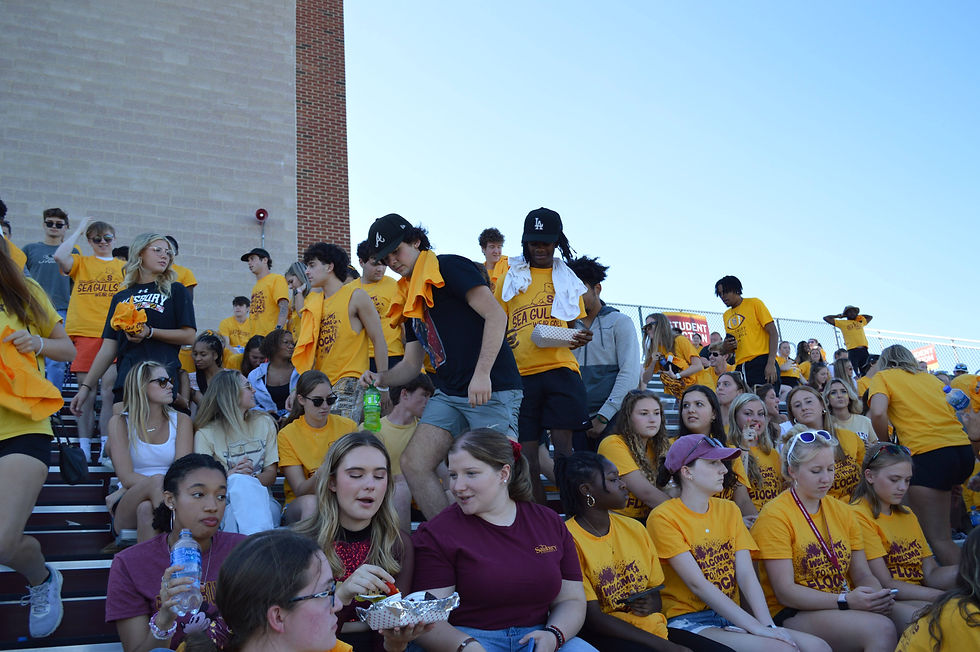Salisbury University students speak for the bees with "Pollinator Week"
- Apr 23, 2019
- 3 min read
Updated: Apr 23, 2019
In recent years, bee populations have seen a sharp decline, and while many people may not initially see an issue with this, students enrolled in Salisbury University's Honors College course "Where Have All the Honey Bees Gone?” came out to tell students why they should care.
In a week titled "Pollinator Week," members of the class are handing out informational pamphlets as well as conducting a number of different activities to raise awareness on bee importance, while raising funds for SU's apiary.
Beekeeper and instructor for the course Jessica Walter shed light on why the class decided to make the week of events, and why bees are so important.
"Honey bees have been in decline across the U.S. and actually across the world for quite a few years now," Walter said. "Bees are very important because they do pollination, and in fact, one in every three bites of food we take is pollinated by honey bees, so without that we would have a very bland diet, as many fruits and vegetables need honey bee pollination."
In helping the bee population thrive in a time that they are in great decline, Walter suggests planting a variety of flowers and vegetables in order to give bees a diverse source of food.
Bees get their food from pollen that provides them with necessary fats and oils, and nectar, which provides them with carbohydrates.
It is suspected that the bees are in decline partly due to a lack of these nutrients.
Along with a lack of nutrients, bee populations also struggle to thrive when people forcibly destroy nests rather than letting professionals take care of them.
Walter explained that the best way to get rid of an unwanted bee hive would be to ask beekeepers to remove them as a means of relocating them to safer areas instead of killing them.
Students from Walter's honors course helped to come up with a week of events to be held in Red Square April 22 to the 26 from 10 a.m. to 4 p.m.
Freshman Tyler Felton is currently enrolled in the course and was in charge of raffle tickets and information at the Pollinator Week table.

While Felton is majoring in business, he found the course to be very versatile in that really anyone could take the course regardless of their major.
"There is a business side to beekeeping which I find really interesting, so it really does bring in all kinds of majors. Like Stephanie, who's working with me right now, is a computer science major,” Felton said.
Felton is glad he took the course because it opened his eyes to how important bees really are, and he hopes that with events like "Pollinator Week" he can help others to learn that as well.
"I think it's so important to spread the awareness about bees because, although they aren't an endangered species, they do die often in the wild do to harsh conditions — like in Maryland during the winter," Felton said. "And I think it's important to get more people interested into saving these bees because they do provide a lot of our fruit and vegetables."
Along with Felton, other students enrolled in the course emphasized that while the class revolves around science and the environment, it is open and applicable to all majors.
Sophomore and double major in math and computer science Stephanie Warman explained that initially she took the bee-keeping course to fulfill a requirement, but she ended up "getting a lot out of it."
"It really has nothing to do with my major, but I still think it's really cool to learn about why bees matter and how they're so smart and just so randomly interesting,” Warman said.
Warman went on to explain how fascinated she was with all that bees do, highlighting that outside of fruits and vegetables, bees also pollinate all of the almond crops in California, which is 80 percent of the world's almonds.
Going into the class, Warman did not expect to become as invested with the course and the knowledge as she did, but she admitted she was very glad she took the class.
"I just realized how actually important they really are," Warman said.
Events for the week include viewing of a bee hive, interacting with hive tools and learning more about what bees do, as well as a series of giveaways, raffles and more.
On Tuesday, April 23, the group is inviting all members of the SU community to come out and plant marigolds in contribution to the Save The Bees effort.
By CAROLINE STREETT
Gull Life editor
Featured photo: Caroline Streett image.



Comments